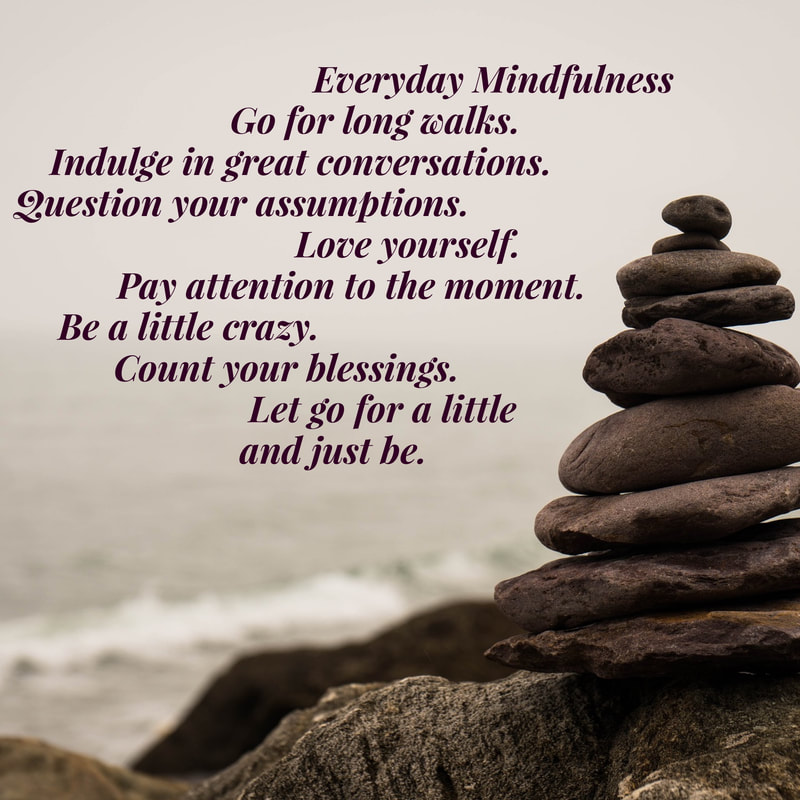|
Mindfulness enters our everyday conversations in a powerful way. But what does mindfulness really mean? Mindfulness is self-awareness. It’s noticing and paying attention to thoughts, feelings, behavior, and everything else. Jon Kabbat-Zinn, PhD has studied mindfulness more than 35 years and is the creator of Mindfulness-Based Stress Reduction (MBSR). Dr. Kabbat-Zinn says practicing mindfulness is actually a form of meditation, yet you don't have to practice for 20 minutes at a time. You can be mindful anywhere, anytime, with anyone. Mindfulness and meditation are mirror-like reflections of each other: mindfulness supports and enriches meditation, while meditation nurtures and expands mindfulness. Where mindfulness can be applied to any situation throughout the day, meditation is usually practiced for a specific amount of time. Mindfulness is simply awareness. It has been defined as a state of moment-to-moment awareness of one's experience without judgment. This requires being aware of and attentive to what’s going on inside and outside of your body. This requires being in the present, not being on “autopilot,” or going through the motions of life without a clear connection to what you’re feeling or doing. Mindfulness is the act of being in the present, focusing completely on the task of what you are doing, removing any mind chatter and emotions from the mind. There is often a fine line between meditation and mindfulness, but there is a difference. Mindfulness requires some measure of self-awareness in order to recognize whether you’re being mindful or not. It’s a conscious endeavor, meaning that life’s circumstances make it hard to maintain for extended periods of time. It is important to regularly refocus our attention when our mind wanders. Mindfulness is the awareness of “some-thing,” while meditation is the awareness of “no-thing.” As for its benefits, according to the American Psychological Association, empirical evidence suggests mindfulness helps reduce stress, improve focus and working memory, lower emotional reactivity, increase cognitive flexibility, and improve relationship satisfaction, to name a few. How you can apply mindfulness to everyday life: 1. Decide to be more mindful. This may sound obvious, but intention is everything. By simply making the commitment to be more mindful, you prime your mind for being more attentive and aware of what’s going on around you. You’re also more likely to recognize when you’re not being mindful and shift your awareness. 2. Leverage moments of “waiting.” Mindfulness can be practiced at any time, wherever we are, whoever we are with, and whatever we are doing, by showing up and being fully engaged in the here and now. Whether you’re waiting for an elevator, a friend at a coffee shop, an Uber, or simply at your desk for slow web page to load, our days are filled with opportunities to tune inward. Simply notice the space around you, take a few deep breaths, and check in with how you’re feeling at the moment. Pause, reflect, breathe. 3. Listen closely when people speak. How much of what others say do you think really gets through? How often do you find yourself distracted while someone else is speaking? Are you preoccupied by personal thoughts or thinking about what you are going to say in response? Conscious, active listening is a great anchor to mindfulness. Whenever you're in conversation, aim to pay closer attention, make eye contact, and ask clarifying questions to fully understand what the speaker is saying. This is being more mindful. You’ll gain more insight, form deeper relationships and promote greater inner calm. 4. Notice the senses. Your senses offer continual invitation for mindfulness to whatever the stimuli of the present moment. Gaze longer and take in the thought-provoking views of your daily commute; touch someone in a loving and appropriate way and notice the many ways that you appreciate them; listen to the murmur of sounds outside your window and decipher their translations. If you’re not sure where to start, feel your own heartbeat or the rise and fall of your breath. Consciously savor that delicious bite of food as you let it linger a bit longer on your tongue. Smell the fragrant bouquet of garden-fresh flowers as you stroll through the park. Stare up at the constellations and capture the night sky in all of its glory. 5. Seek out nature. Go outside and just be. Take off your shoes and go barefoot. There is something awe-inspiring about nature that easily quiets the mind. Going on hikes to watch the sunset is nice, but you can experience mindful benefits of nature almost any day. Step outside for a brief walk during your lunch break. Even pulling up beautiful photos of nature online and imagining yourself outdoors is helpful. Seek out nature as much as you can and observe it closely. Think about how you can enjoy being in the moment and cultivating mindfulness into your daily activities. What if you consciously spent one day immersing mindfulness into your everyday experiences? Tonight, as you make dinner, notice the delicacy and vibrant color of each vegetable as you chop into tiny little pieces. Savor the sweet and pungent smells from the combination of items that come together in the pan. Pause and reflect on how each glorious food will nurture and fuel your beautiful body before you eat. Give thanks for the blessings of healthy food. Finally – savor each and every bite! Adding mindfulness into our everyday routines like making dinner can add magic and delightful charm to our normally boring activities. Try it and let me know what you think! www.medicaldaily.com/mindfulness-meditation-differences-377346
https://www.medicaldaily.com/mindfulness-healthy-glucose-levels-375027 https://www.apa.org/monitor/2012/07-08/ce-corner https://www.medicaldaily.com/fighting-childhood-obesity-mindfulness-exercises-may-recalibrate-part-brain-370296 https://www.medicaldaily.com/mindfulness-meditation-boosts-sleep-quality-among-older-adults-offering-alternative-322300 https://www.medicaldaily.com/mindfulness-reverses-effects-opioid-drug-dependence-patients-find-happiness-healthy-313402 inlpcenter.org/the-benefits-of-mindfulness-how-could-it-help-you/ https://outwittrade.com/mindfulness-benefits
0 Comments
Your comment will be posted after it is approved.
Leave a Reply. |
Categories
All
�
Archives
November 2022
|


 RSS Feed
RSS Feed